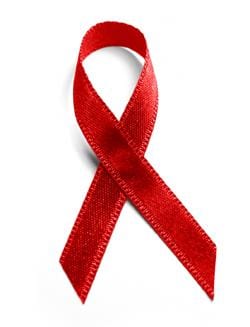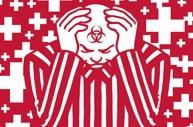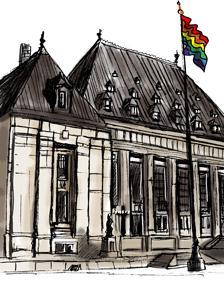Earlier this year, Johnson Aziga of Hamilton was convicted of two counts of first-degree murder for not disclosing his HIV status to unprotected-sex partners who subsequently died. Now the floodgates have opened.
CRIMINALIZATION CREEP. Since the justice system got involved with HIV transmission, the severity of charges has consistently increased. Read more in our story: Canada’s record of criminalization creep.
(Ken Bosem illustration)
At least two more men of colour have been charged with attempted murder since then, after supposedly not informing sex partners they have HIV. One of them met his male accuser online. The police released names and photographs of both men to the press, and postered the Toronto gay village with images to try to drum up additional criminal charges.
We are sharply divided about who is responsible when people are exposed to HIV, and what to do about it. The rift in public opinion exposes a broader divide in awareness and emotionalism between those with HIV and those without, but even some HIV-positive people argue in favour of locking up those who don’t disclose but play unsafely with their consensual partners.
A growing chorus of activists, civil-society advocates and community members is rallying evidence to show that jailing people with HIV only quenches the individual and public thirst for retribution and blame—while failing to prevent onward HIV transmission. But if we oppose the criminalization of HIV exposure, what’s the alternative? If we’re truly committed to reducing HIV infection, what do we need—from the police and courts, from public health, medical and educational authorities, from the mainstream media and queer press, from AIDS service organizations, and from one another as individuals—in order to succeed at that vital goal?
Understanding the problem:
On the surface, the criminal response to HIV exposure may seem like a fair measure to protect society from a small number of dangerous wrongdoers. After all, if someone withholds their HIV status and exposes other people to potential danger, wouldn’t we all be better off if they were punished and the public were protected? But if you actually take a closer look at how the law is currently applied, the stance of the police and courts is revealed as morally bankrupt, and rife with a horrifying potential for abuse.
“It’s exposure without disclosure, not HIV transmission, that’s the crime,” noted Glenn Betteridge, speaking on behalf of the Canadian HIV/AIDS Legal Network at a recent teleconference on HIV criminalization. This means if two people decide to have unprotected sex, and one of them merely claims the other knowingly did not disclose their positive HIV status, the one with HIV can be arrested.
HIV exposure in itself is an improvable event with no negative outcome—but it can now be the basis of a charge of attempted murder. Although Canadian courts have also suggested that people who don’t know their own positive status may still be culpable, criminalization has been directed primarily at people who know they have HIV.
But evidence has shown that people with diagnosed HIV receiving medical care are the least likely and least capable of transmitting the virus—in fact, the Swiss Federal Commission for HIV/AIDS has argued forcefully that in some circumstances, transmission is impossible even during sex without condoms—putting the very concept of HIV exposure to question.
In essence, police actions and court rulings are legitimizing the idea that people with HIV should be forced to disclose personal medical information even in circumstances where no harm has come to anyone. And although the 1998 Supreme Court Cuerrier ruling established a “significant risk of serious bodily harm” as the key criminal consideration, some of the cases coming up today have involved activity that has for decades been considered low-risk, such as oral sex.
Despite the police obsession with disclosure on the part of people who know they have HIV, several recent studies have indicated that the majority of all new infections originate in people who didn’t know they were positive—meaning disclosure of status was completely irrelevant. As New Haven–based epidemiologist Edward White has noted, “Failure to disclose does not transmit infection, unprotected sex does.”
And even when HIV is actually transmitted, it’s not scientifically possible to conclusively prove which person infected the other—or if the source was a different person altogether. According to the UK-based advocacy group NAM, a specialized set of tests, called phylogenetic analysis, “can only determine the degree of relatedness of two samples of HIV. It cannot create a definitive match.”
All of this means that any person with HIV could be the target of criminal charges in cases where they did not harm anyone, or where the harm caused to someone could in strong likelihood been related to someone else altogether. A vindictive person could use their knowledge of someone’s HIV status as a weapon against them. Many believe this is what happened last year in the case of “Diane,” a Montreal woman whose partner suddenly alleged she had not disclosed her HIV status once she pressed charges against him for domestic assault.
Some people with HIV have been threatened by people they’ve never even been intimate with. Fred Meikle of London, Ontario, says he had an exchange last year with an acquaintance in a gay.com online chatroom where the person stated, “I should call the police, tell them you didn’t disclose.” Meikle replied “We’ve never even had sex; you sat on my sofa and drank a beer.” He says the man replied, “Well, who do you think they will believe?”—highlighting the rift in social power between HIV-negative and positive gay men.
Understandably, this creates a climate of literal “terror” for people with HIV, says Angel Parks, Positive Youth Outreach coordinator for the AIDS Committee of Toronto (ACT). “This is spiraling out of control,” she says about the upswing in criminal charges. At a recent forum in Ottawa in June, she reports, people with HIV from across the country responded to the criminalization threat with “fear, shame, humiliation, and most of all confusion.” And at the weekly support group she coordinates, “individuals are scared… they don’t know to protect themselves” from the risk of bogus charges.
Meanwhile, because of the legal fixation of disclosure of known HIV status, the untested men and women most involved in transmitting the virus—those most desperately in need of education, counselling and treatment—are basically ignored, by the courts and by society at large.
One of the biggest concerns raised by many anti-criminalization advocates is that fear of criminal charges may deter untested people from learning about their status and getting treatment and support—but this may not actually be the case, says Edwin Bernard, a Berlin-based criminalization expert who has been tracking cases around the globe.
“There are plenty of reasons why people don’t test for HIV, but for most people, worrying about being arrested doesn’t register on the radar at all,” says Bernard. Sometimes the opposite result is found, he notes; in Iowa for instance, which has very backward and highly punitive laws in place regarding HIV transmission, the number of people voluntarily getting tested doubled last year over the year before.
Regardless, criminalization should be opposed because it is both unethical and ineffective. “The reverse of what the law hopes to achieve is what’s actually happening,” says Elliott Youden of the Ottawa-based activist group Legalize AIDS. “HIV rates are going up; more people are becoming infected.”
“These issues don’t even belong in the legal sphere at all,” argues Leanne Cusitar, a longtime sexual-health educator. HIV persecution is another example of failed legislation of personal morality, along the same continuum as prohibitions against sex work and drug use, and age-of-consent laws, she says. “Criminal law is being used as a bludgeon to unsuccessfully try and force behavioural change,” she says. “It uses the rhetoric of protection, but it’s really about robbing people of both personal agency and shared responsibility.”
Just 40 years ago, before the introduction of Bill C-150, gay sex itself was criminal—based on misconceptions about the ethics and morality of queer people. Today, HIV is criminalized in part because of inadequate knowledge of sexual risks, a stunted understanding of shared sexual responsibility and the demonization of positive people as “willful infectors.” How will we look back on this moment 40 years from now? And how much damage could be done to the movement for HIV prevention—and to the human rights of people with HIV—in the meantime?
“We must unite to address the causes of such unjust laws and to resist their effects,” according to justice Edwin Cameron of the Constitutional Court of South Africa, speaking at the first annual symposium on HIV, law and human rights, organized by the Canadian HIV/AIDS Legal Network in June. Cameron was the first senior South African official to state publicly that he was living with HIV.
Cameron pointed to Canada’s “dark distinction” as a world leader in HIV criminalization cases, saying this appeared to legitimize criminalization on the world stage and provided encouragement to other nations implementing similar measures, in Africa and beyond. “The global trend towards criminalization of HIV is accelerating,” said Cameron, “with significant human and legal consequences.”
Should we criminalize at all? Cameron recommends the position put forth by UNAIDS—that criminal action is in fact justified in a very small number of cases, only where HIV has actually been transmitted and where it can be proved that the person specifically intended to pass on the virus to another person.
Changing the terms of the debate:
BUMP & GRIND. Reversing the tide of HIV prosecutions will be no easy feat. It will involve a significant injection of cash and resources into the public health infrastructure, alongside a moratorium on HIV-related criminal charges. Read more in our story, Finding a way out of the HIV criminalization loop.
(John Crossen illustration)
It’s impossible to talk about the criminalization debate without addressing the wide gap in views on the ethics of unprotected sex and HIV disclosure—including, in particular, among communities of men who have sex with men, where the issues are strikingly resonant because the prevalence of HIV is often high.
When it comes to HIV, the Canadian legal apparatus is fixated on disclosure—the idea that people who know they have HIV have an obligation to tell sexual partners. Media pundits like conservative columnist Margaret Wente also trumpet this notion. The opinion is common in the queer community as well.
In fact, studies conducted by Sigma Research of London UK have shown that 70 percent of HIV-negative gay men expected disclosure if a sex partner was positive. Their research also indicates that the men with the least amount of knowledge or awareness about how HIV is actually transmitted are the ones most likely to demand to know.
The common perception goes something like this. HIV is extremely dangerous, inevitably fatal and not that hard to get. People with HIV have an obligation to tell all partners before any sexual activity at all—because it’s not possible to consent to sex without knowing if the other person has HIV.
To some who espouse this way of thinking, anyone who doesn’t disclose is dishonest, untrustworthy and likely predisposed to barebacking—after all, if their senses of ethics and responsibility were not lacking, they probably wouldn’t have contracted the virus in the first place. Is it much of a stretch to argue that a person like that wouldn’t think twice about giving someone else HIV on purpose?
If we care about preventing HIV and creating healthy community, we need to throw these misconceptions out the window. Sex has never been risk-free for anyone, but what’s proven most successful ever since the advent of AIDS is safer sex, rather than policing other people’s HIV status. Yes, HIV differs from other sexually transmitted infections in that there is currently no cure—but the other key difference is that it is also far harder to acquire, and transmission is much easier to avoid.
“Disclosure is just not relevant, if as a gay community we are interested in reducing the number of us who get HIV,” says Ottawa-based prevention educator Nicholas Little. Contrary to public perception, he adds, “Evidence shows the majority of HIV-positive men go to great lengths to make sure they don’t transmit the virus to anyone else.”
You don’t need to know the other person’s status to consent to sex with them, Little asserts. “The act of disclosure does not prevent transmission, employing harm-reduction methods does… [An HIV-negative man] has the right to use certain harm reduction methods or not use certain harm reduction methods with any of his partners.”
Barry Adam, a sociologist and the senior scientist and director of prevention research at the Ontario HIV Treatment Network, says reliance on disclosure is actually dangerous. Speaking at the June human-rights conference sponsored by the Canadian HIV/AIDS Legal Network, he pointed out that “disclosure is not associated with higher rates of protected sex among gay and bisexual men.”
Adam believes that the fear and anxiety caused by the threat of criminal charges and attendant media coverage may lead positive men to disclose only inconsistently. Research shows that “those who disclose inconsistently have higher rates of unprotected sex than those who either always disclose or never disclose.” According to Adam, “People use reliance on [the other person’s] disclosure as a way to avoid having safer sex, rather than relying on this tried-and-true method of preventing HIV transmission.”
But gay men haven’t done a good job of passing on the harm-reduction message to new generations, says Richard Berkowitz, one of the originators of safe-sex education in 1983 and subject of the recent documentary Sex Positive. “Today, even progressive gay people fall into the trap of imagining that we are talking about sexual predators who deserve to be locked up.”
The perspective Berkowitz points out hinges upon seeing negative and positive gay men as fundamentally different from one another. This is a mistake, noted Sigma Research’s Ford Hickson in an address to a UK sexual health conference in March. What most often distinguishes positive and negative guys is not ethics or behaviour, but bad luck.
“HIV risk is widespread. It is not the case that a small group of hardcore risk takers account for the new infections,” said Hickson. “The transmissions that occur over the next year will be the unlucky ones in a large population each taking a few risks.”
There are many circumstances in which unprotected sex may not be the best choice for men having sex with men. But just as it is ubiquitous and unchallenged in the lives of many straight people, it’s also a reality for queer people, including positive and negative guys. It’s a mistake to oversimplify this, according to psychotherapist Jason Winkler.
Sometimes a person’s urge for potentially risky sex can be borne of developmental challenges, leading to “becoming quite prone to shame, and reaching out to get their needs met in unhealthy and self-harming ways.” But other aspects of the desire for unprotected sex can be understandable and healthy, he adds, including “to deepen intimacy, to feel vital and alive, and wanting a sense of belonging.” This is as true for people with HIV as it is for those without.
The most important difference between people with HIV and HIV-negative folks is their comparative disparity in social power, and the impact of stigma and discrimination that one side can enact upon the other. A 2006 study by the Public Health Agency of Canada pointed out that half of Canadians would feel uncomfortable using a drinking glass once used by a person with HIV. This, when we have known for twenty years that many sexual acts are completely risk-free for serodiscordant couples, and some others offer transmission risks that are infinitesimally small.
In the face of increasing criminalization, the impact of stigma is getting worse, says Murray Jose, executive director of the Toronto People With AIDS Foundation. “We still hear about people losing jobs, losing families, losing housing and occasionally experiencing physical violence when they disclose.” So while sex without disclosure is not necessarily intrinsically risky, disclosure—in and of itself—is frequently dangerous for people with HIV. So expecting it under all circumstances is just not reasonable.
Media sensationalism only compounds stigma. Witness Rosie DiManno’s histrionic coverage of the Aziga case in the Toronto Star, where she editorialized that “he cut a wide swath with his penis.” This sort of coverage reflects “xenophobic, racialized rhetoric,” says health advocate Cusitar.
The Globe and Mail’s Margaret Wente has also jumped on the bandwagon with several articles propounding her personal ethical perspective on disclosure for gay men with HIV. Media coverage of men who have sex with men and criminalization “raises the spectre of gay men as diseased, predatory, and dangerous—out to kill, to take everyone with them in a debaucherous way,” argues Cusitar.
One aspect that unites most media reports is the constant repetition of the idea that when positive people allegedly have unprotected sex, the reason is a desire to deliberately give others the virus. Except in a minuscule number of truly sociopathic individuals—a number dramatically smaller than the number of charges actually being laid—this is absurd.
And damaging. “Unethical, sensationalized stories convict people before they even have a chance to stand trial,” says youth worker Angel Parks. “They wrongly portray people who don’t disclose as a menace to society.”
The media and police would have us believe that irresponsible people with HIV are out there victimizing others—but we should never forget that the reality is the other way around. People with HIV are an oppressed minority subject to frequent acts of discrimination by others who have power over them—including the accusers in criminalization cases.
Public health and the public interest:
Public-health authorities are frequently recommended as an alternative to the use of criminal law. But public health will require new approaches and better funding if it is to properly meet the challenge of managing HIV risk. And public health departments across the country are experiencing a chill because of police activities around HIV, and altering their best practices to avoid implication in law suits.
In Ontario for instance, public-health agencies are empowered by the Health Protection and Promotion Act (HPPA) to keep a file on people with HIV for their entire lifetimes, and in cases where there is concern about whether the person is playing safe, they can issue a Section 22 order. This order can command that a person always use condoms, that they always disclose, and that they never share needles—on threat of a fine or jail time if they disobey.
Section 22 orders are “not very common at all,” says Martin Duchesne, a health promoter with Toronto Public Health (TPH). Most of the interactions that public health has with a person with HIV are meant to be helpful, he says—for example, connecting a newly diagnosed person with a primary care physician, or a supportive immigration lawyer if necessary.
But in some ways, the demands of TPH for people with HIV are even more stringent than those laid down by the historic Cuerrier decision. Although TPH’s sexual-health principles specify a pro-choice mandate—this is not the case when it comes to HIV disclosure. They counsel all people with HIV to disclose to all sexual partners even in the absence of risky behaviour. And sometimes their case-investigation approach could lead to someone being wrongly suspected of either non-disclosure or unsafe activities. “It’s a judgment call,” Duchesne admits.
The upswing in criminalization is increasingly having a negative impact on public-health jurisdictions, Duchesne points out. Different local authorities have leeway in terms of how they apply HPPA, he says, and in places where there have been many criminal cases, such as Peel region, rules will be applied more strictly than they otherwise would, in order to try and keep the public-health units themselves out of the courts.
More resources and better staffing would improve the ability of public health to provide more education and support to newly diagnosed people, says Duchesne. “Otherwise,” he acknowledges, “we are only contacting people when something may have gone wrong.”
In cases where there are real concerns about people not disclosing and having unprotected sex, the “Calgary Model” developed by the Calgary Health Region has been cited by advocates as a recommended approach. This model promotes the health of both people with HIV and their partners and starts with less restrictive strategies, increasing in severity only if warranted.
Because Alberta has an intensive case management process working supportively with newly diagnosed people, there have only been a handful of comparatively minor criminalization cases there. In 2005, the Calgary model was endorsed by an intergovernmental panel of experts, who specified that if there was no risk or negligible risk, disclosure was not expected.
Education is liberation:
ENOUGH IS ENOUGH. Former HALCO chair Bob Watkin is calling on HIV-positive people to take a stand against the criminalization of HIV. Read our interview transcript with Watkin.
(Jenna Wakani photo)
Reducing future diagnoses and insisting on a model of shared responsibility requires an informed community. But challenges to effective sexual education could mean new generations of Canadians have inadequate knowledge about sexually transmitted infections and lack personal empowerment around sexual health.
In Alberta in June, legislators passed Bill 44, which will allow parents to remove their children from class when lessons about sex or sexual orientation are taught. And in 2007, the Alberta government stopped publishing “Growing up OK!” a sex-education pamphlet that previously been distributed across the province by the thousands. Meanwhile in other parts of the country, youth are receiving inconsistent sex ed as well.
This year, the Toronto Teen Survey found that eight percent of all teens had not received any sexual education at all—despite the fact this is a mandated part of the curriculum. Jess Abraham, a sexual health promoter with TPH, says the quality of sex ed in schools is “highly inconsistent.”
“It can depend on where they live, what school they go to, and the commitment of the individual teacher,” says Abraham. She says some students receive excellent training in sexual health but others go without. She’s visited grade 8 classes to provide information on HPV vaccination and discovered that the STI and birth-control lessons that had been mandated to take place the year before just never happened.
Just as important as the technical details about having sex and avoiding STIs, according to Abraham, is encouraging self-esteem and empowered decision making. “I try and get them to think about their own bottom lines; what they want to get out of encounters and relationships, and what risks they are and are not willing to take.”
That’s important advice for all communities at risk of HIV infection. Adults need sexual education too—and we need education that is detailed and community-specific. Great recent examples include an online “Poppers 101” lesson by Ottawa’s Nicholas Little and an excellent primer on Hepatitis C produced by Vancouver’s Health Institute for Men (HIM).
A key component to sexual education is to understand the need for regular testing for STIs, including HIV for people who are HIV-negative. But we also need to be cognizant of external barriers to testing even for those who understand its importance, says Little. “We always focus on the individual—but I am more concerned about the structural problems posed by institutions.”
“The relevant question is how do we make testing as accessible as we can. We need to tailor the HIV testing system to gay men’s needs—not the other way around. If we genuinely want to reduce HIV infections, we need to make it safe and comfortable for gay men to get tested, and for gay men to acknowledge their role in getting tested regularly.”
What is to be done:
If we want to turn back the criminalization tide and promote better sexual health for everyone, we may have to get angry and loud. As Justice Cameron of South Africa told those assembled at the Canadian HIV/AIDS Legal Network’s recent symposium, “some of the Canadian cases are so outrageous, I have wondered why there weren’t protestors outside the courtroom with T-shirts and placards and activists shouting inside the court room. Have you lost your activist fervour?”
Cameron is right. We need to rekindle the queer rage and sense of injustice that fuelled historic LGBT protests, from the response to the bathhouse raids, to the efforts of Gay CourtWatch in the ’80s to protect gay men busted on sex-related charges, to the beginnings of the original AIDS activist movement.
And we need a coalition of negative, positive and untested queers and allies to carry out this effort. Criminalization is an extreme manifestation of HIV stigma—and it shouldn’t be only people with HIV who put themselves on the line to fight it. With tools ranging from placard and megaphones to Facebook and Twitter, we need to combat the abuses of the police, the justice system and the media, and demand access to appropriate testing resources and consistent and high-quality sex education for all, regardless of HIV status. Some of that work is already beginning.
On June 10, activists and progressive MPs met on Parliament Hill to decry HIV criminalization. The protest was organized by recently formed activist group Legalize AIDS. Elliott Youden, a founder of the Ottawa-based group, says he knew something needed to be done when he heard about Toronto police plastering a positive man’s face all over the gay village as a so-called “public safety alert” after arresting him. “It was just such a violation.”
The group is focused on “prevention through education,” Youden says. Future plans include doing workshops with judges and crown prosecutors
AIDS service organizations are also increasingly vocal about criminalization. In Ontario, 20 organizations from across the province have banded together to condemn criminalization, including ACT—which has had a policy in place opposing the practice since 1996.
Beyond policy statements, we need to meet men who have sex with men where they are—and in our intimate lives, where we are is increasingly online. The virtual sex arena—with its ubiquitous ads demanding “disease-free” partners—is a prime site where HIV stigma transpires.
But one service that intends to aggressively fight against HIV criminalization is Manhunt Cares, affiliated with the online hook-up site Manhunt. Run by David S Novak, former national syphilis elimination coordinator for the US Centers for Disease Control and Prevention (CDC), the site links men who have sex with men to supportive resources and sexual-health information from “key health partners including national and international researchers” who help ensure the messages are accurate and appropriate. Those messages will soon include anti-criminalization critiques through a partnership with the gay men’s health blog LifeLube.
Vancouver Coastal Health has used the site since 2006 to provide notification, education and counselling services to members whose sex partners have tested positive for STIs, as do a collection of 42 public-health partners across 23 American states. Novak says that only services from states with a record of progressive practices are allowed to reach out to members of his service. He checks all requests against the records of the ACLU, which tracks variances in HIV criminalization practices across US states. Those who criminalize HIV exposure have been shut out.
The site has promoted videos that raise questions around shared responsibility, HIV disclosure and safer sex, and Novak is working on a proposal to conduct a scientific study of site members’ opinions on criminalization. They also aggressively promote multiple HIV testing options, including a service that allows men to visit one of 2,500 testing facilities and subsequently get results confidentially online through health provider GetSTDTested.com.
Upcoming projects include safer-sex porn videos produced to be both hot and rooted in behavioural science. “The videos will demonstrate safer-sex negotiation, all in a cutting-edge, XTube-style format,” says Novak.
Sometimes the online response to HIV criminalization can be highly personal, rather than systemic, in nature.
“I hereby declare that I deem every man I have any sexual contact with to have disclosed to me that he is HIV-positive, regardless of what he says and regardless of whether or not that virus is now or has ever been in his body,” wrote Paul Leonard in his popular online blog.
Leonard says his anger about the emergence of attempted murder charges for HIV exposure prompted the public declaration. He was particularly bothered by the fact that police told media that those who had had “any contact” with the accused—not just unprotected sex—should get in touch with them or a doctor.
“This growing trend of criminalization fosters negative changes in how people, viruses and sex acts are conceptualized,” he says. “Instead of a person infecting another person, we get a criminal victimizing an innocent person, and the virus moves from being an unpleasant biological entity to being a weapon. The police—and, I fear, the public—begin to see a biological hazard rather than a person, and start to talk and act as if the person who is HIV-positive is intrinsically dangerous.”
To Leonard, the position of gay men in favour of criminalization makes no sense. “I am responsible for my own actions, and there is no meaningful difference in risk to me whether I have sex with an openly positive person, a person who knows he is positive but does not disclose it, or a person who does not know he is positive or, indeed, believes incorrectly that he is not.”
Leonard’s assertion that he would never accuse another man of non-disclosure is a significant gesture—because it underscores the fundamental point that all people have sexual responsibility. Ultimately, the solution to criminalization in the queer community is not that all HIV-positive men be required to disclose—it’s that HIV-negative men stop pressing charges. Indeed, if we want to create a world where all people with HIV can safely choose whether or not to disclose, and where all people feel empowered to make healthy choices about the sex they have, all of us have a role to play.






 Why you can trust Xtra
Why you can trust Xtra


